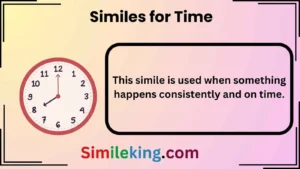Anger is a complex emotion that everyone experiences. Whether it’s frustration, irritation, or full-blown rage, how we describe our feelings matters.
While the word “mad” is commonly used to express anger, there are numerous alternatives that can capture the tone and intensity of this emotion more effectively, especially in different contexts.
In this article, we will explore over 15 similes and phrases you can use to express anger. These similes range from casual to formal, polite to more intense, and will help you express yourself with nuance and clarity.
The goal is to offer readers various options for communicating their emotions, ensuring the right tone in different situations.
Table of Contents
- Introduction to Similes for Mad
- Why Use Similes for Expressing Anger?
- Casual Similes for Mad
- Polite Similes for Mad
- Professional Similes for Mad
- Intense Similes for Mad
- How to Choose the Best Simile for Your Situation
- Conclusion
Introduction to Similes for Mad
Similes, figures of speech that compare two things using “like” or “as,” offer an interesting way to express emotions. When we say someone is “mad,” we often mean they’re angry, upset, or even furious. But to add color to our language and convey a more accurate tone, similes are a powerful tool. These expressions can help us avoid sounding too blunt and provide a way to more clearly describe the intensity of our feelings.
In this guide, we will look at different ways to express anger using similes, ensuring that you can adapt your language based on the tone, formality, and context of your conversation.
Why Use Similes for Expressing Anger?
Using similes to express anger allows you to:
- Convey nuance: Not all anger is the same. Sometimes, you’re irritated; other times, you’re furious. Similes help express these different levels.
- Prevent misunderstandings: Using the right words and comparisons ensures your emotions are understood accurately by others.
- Improve communication: Polite and professional expressions can smooth over potential conflicts and help maintain respectful relationships.
Casual Similes for Mad
In casual conversations, the tone can be more relaxed, allowing for playful or exaggerated comparisons. Here are some casual similes for “mad” that can be used with friends, family, or peers:
1. Mad as a hornet
This simile compares someone’s anger to a hornet, known for being irritable and aggressive. It works well when someone is visibly angry and acting out.
Example: “She was mad as a hornet after hearing about the delay in her order.”
2. Mad as a wet hen
This expression evokes an image of a hen that’s wet and frustrated, symbolizing someone who is extremely upset.
Example: “He was mad as a wet hen when he found out the game was canceled.”
3. Mad as a bag of cats
A playful and exaggerated simile, often used to describe someone who is wildly angry and out of control, much like a bag filled with upset cats.
Example: “She was mad as a bag of cats when she realized she missed her flight.”
4. Mad as a bull
This one compares anger to the violent rage of a bull. It is used when someone is enraged and ready to act impulsively.
Example: “When he found out about the cheating scandal, he was mad as a bull.”
5. Mad as a march hare
This phrase, originating from “Alice in Wonderland,” refers to someone who’s acting irrationally, just like the mad March Hare.
Example: “He’s mad as a march hare after his car broke down on the highway.”
Polite Similes for Mad
In formal or polite settings, expressing anger requires more tact. These similes convey frustration without being overly blunt or harsh.
6. Frustrated as a student who can’t get the answer
This simile expresses frustration in a calm and relatable way, ideal for a professional or educational setting.
Example: “She was frustrated as a student who can’t get the answer when the proposal kept getting delayed.”
7. Irritated as a person waiting in a long line
This expression is subtle and polite, perfect for conveying mild anger in a professional environment.
Example: “He seemed irritated as a person waiting in a long line when his request wasn’t acknowledged.”
8. Upset as someone with a misplaced passport
A gentler comparison for mild upset or frustration, ideal for formal conversations.
Example: “She looked upset as someone with a misplaced passport when her flight was rescheduled.”
9. Exasperated as a teacher explaining the same lesson over and over
This is a great way to express frustration in a professional or educational setting. It conveys an effort to remain patient while feeling overwhelmed.
Example: “He sounded exasperated as a teacher explaining the same lesson over and over when the team kept missing deadlines.”
10. Annoyed as a commuter stuck in traffic
A polite way to express mild irritation or frustration without sounding overly angry.
Example: “She was annoyed as a commuter stuck in traffic after the meeting ran longer than expected.”
Professional Similes for Mad
In a business or professional setting, maintaining decorum is important. The following similes offer a balanced way to express frustration or anger without damaging relationships.
11. Frustrated as a project manager without the right resources
This is a professional way to express frustration, highlighting the challenge of working without essential tools or support.
Example: “He was frustrated as a project manager without the right resources when the budget was cut unexpectedly.”
12. Irritated as a manager waiting for approval
A professional way to convey annoyance when waiting for decisions or feedback from higher-ups.
Example: “She seemed irritated as a manager waiting for approval, as her team needed immediate guidance.”
13. Displeased as a client receiving late service
This simile conveys professional dissatisfaction with service or a delay in business processes.
Example: “The CEO appeared displeased as a client receiving late service when the report was submitted past the deadline.”
Intense Similes for Mad
Sometimes, anger is intense, and we need to use stronger, more vivid similes to express it. These expressions convey a heightened sense of rage and frustration.
14. Furious as a volcano ready to erupt
This simile uses the explosive nature of a volcano to describe intense anger.
Example: “He was furious as a volcano ready to erupt when he discovered the betrayal.”
15. Raging like a wildfire
A powerful simile, comparing someone’s anger to the uncontrollable and destructive force of a wildfire.
Example: “Her anger was raging like a wildfire when she found out about the company’s mistakes.”
16. Livid as a bull in a china shop
This simile emphasizes a state of fury, with the image of a bull wreaking havoc in a delicate space.
Example: “He was livid as a bull in a china shop after hearing the news.”
17. Enraged like a lion defending its cubs
A simile with strong, protective imagery, perfect for describing someone who is intensely angry and ready to act.
Example: “She was enraged like a lion defending its cubs when the company took credit for her work.”
18. Seething like a kettle about to boil over
This comparison illustrates anger that is just under the surface, ready to explode at any moment.
Example: “He was seething like a kettle about to boil over when his colleague interrupted him.”
How to Choose the Best Simile for Your Situation
Choosing the right simile depends on several factors:
- Context: Consider whether you’re in a formal, professional, or casual environment.
- Tone: Think about how intense you want your expression to be. Do you want to come across as mildly annoyed, or are you expressing full-blown fury?
- Audience: Tailor your language based on who you’re speaking to. Use more formal or polite expressions in professional settings, and reserve stronger similes for when you need to convey intense emotion.
Conclusion
Similes are a powerful tool for conveying the subtleties of anger in various situations. Whether you’re talking to a friend, colleague, or client, there’s a simile for every scenario. From mild frustration to full-blown rage, using the right simile ensures that your emotions are expressed with clarity and precision.
When choosing a simile, always keep in mind the tone and setting. This will help you maintain professionalism and avoid miscommunication. So the next time you’re feeling “mad,” remember: you have a range of creative and expressive alternatives at your disposal!





